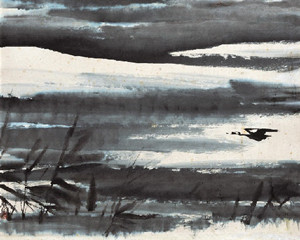《秋雨叹三首》是唐代大诗人杜甫的组诗作品。这三首诗形象地描述了唐玄宗天宝十三载(754年)秋天连月雨灾的情景,寓有讽谏之意。第一首假物寓意,叹自己的老大无成;第二首实写久雨,叹人民生活之苦;第三首自伤穷困潦倒,兼叹民困难苏,有“长夜漫漫何时旦”之感。全诗语言委婉,寓意深切,表现出很强的忧患意识,堪称“史诗”。

杜甫·《秋雨叹三首·其三》
长安布衣谁比数?反锁衡门守环堵。
老夫不出长蓬蒿,稚子无忧走风雨。
雨声飕飕催早寒,胡雁翅湿高飞难。
秋来未曾见白日,泥污后土何时干?
Three Poems Lamenting Autumn Rain
Du Fu
On Changan broadcloths who would speculate?
I bolt the door from within and keep inside four walls.
Hence the access is overgrown with wild grass:
My young boy runs unanxious through the storm.
The soughing rains are hastening an early winter,
The wings of the wild goose wet can hardly fly up high.
Since autumn came we have not seen the sun,
Oh, when shall the muddy earth again be dry?
(谢文通 译)
Lamenting Fall Rains
Three Poems
Du Fu
3
Plain-garbed man of Chang'an, who takes note of him?
Crude gate closed, he keeps to his country plot.
The father goes nowhere, mugwort and brambles grown rampant,
though his little ones, no worries, race around in wind and rain.
Rains hiss-hiss, bringing the cold on early;
from the north, wild geese, wings dampened, can barely fly on high.
Since start of autumn, not once have we seen the white sun.
This earth of ours, muddy, foul—when will it ever dry?
(The "plain-garbed man" in line 1 is Du Fu, who did not wear the robe of an official at this time but lived in Duling on the outskirts of Chang'an. By this time he was married and had a family.)
(Burton Watson 译)
更多精品翻译素材,敬请关注可可英语。












